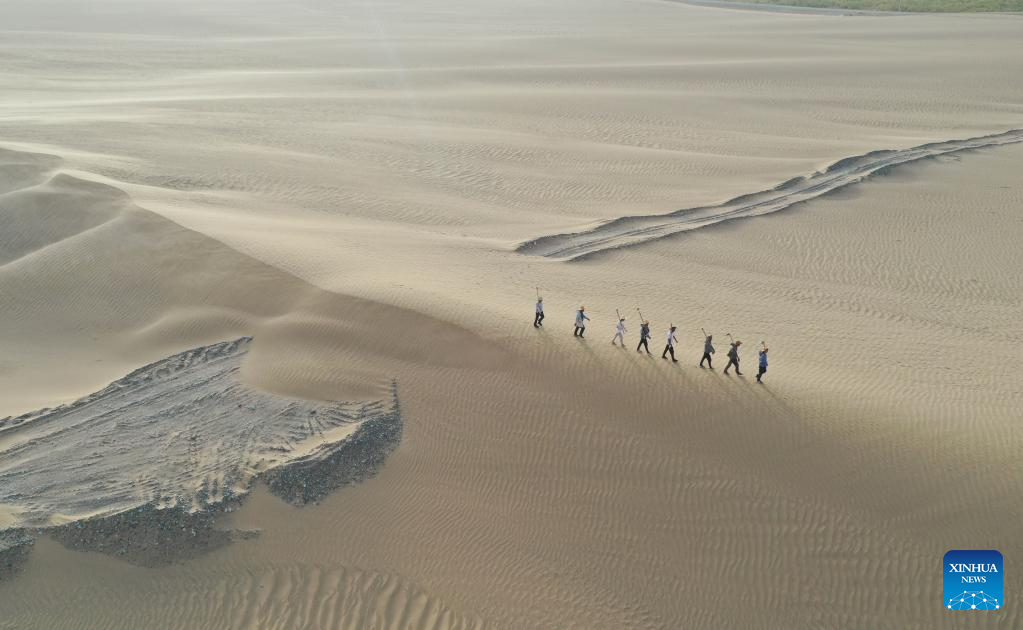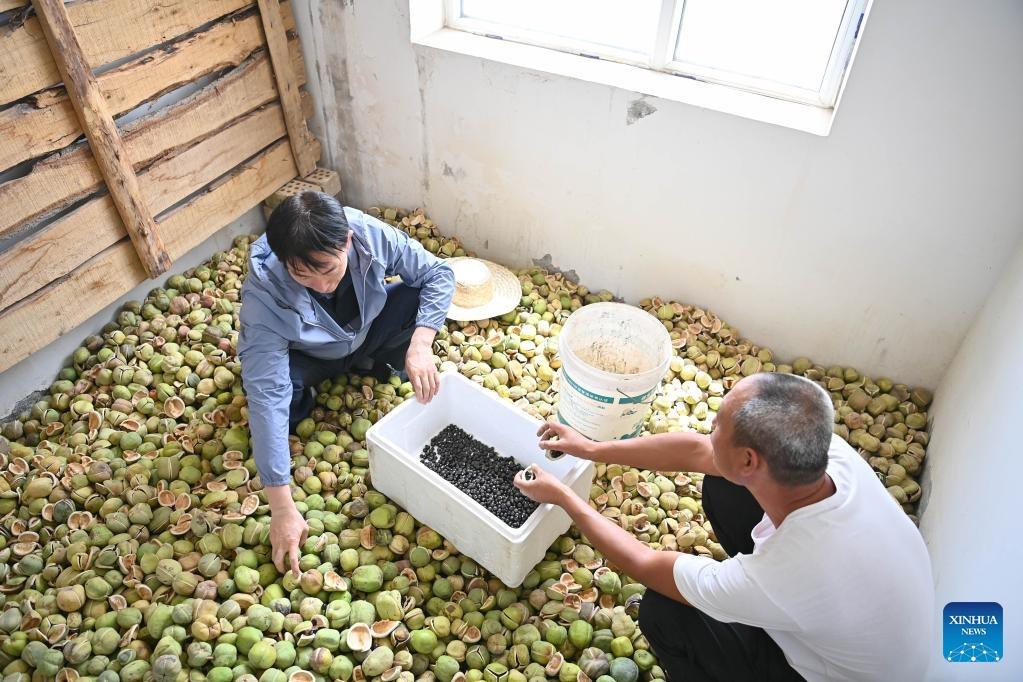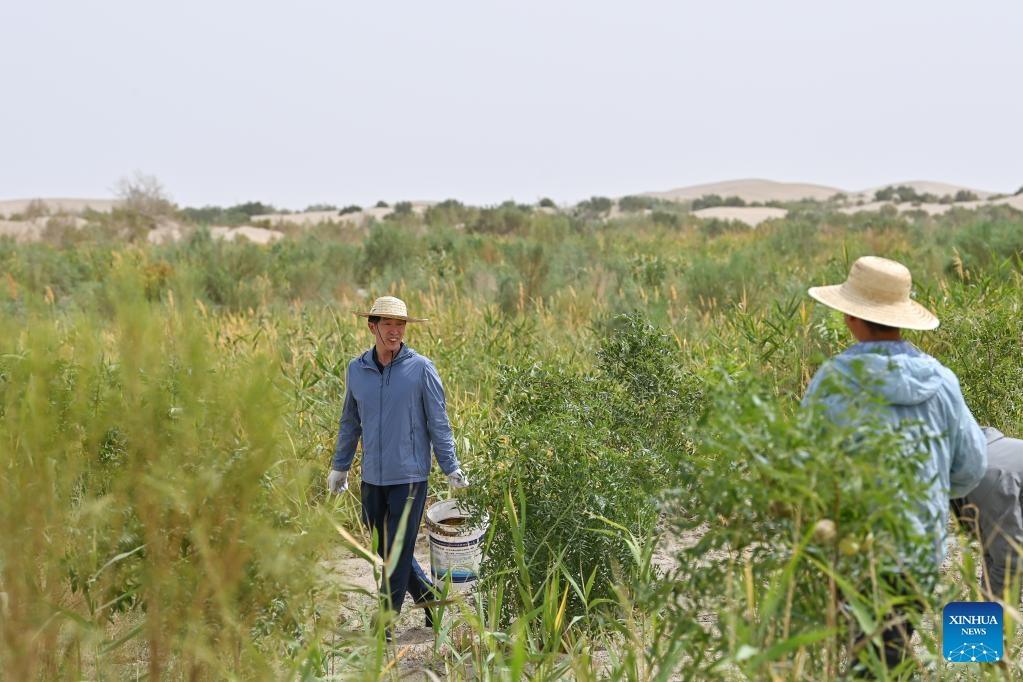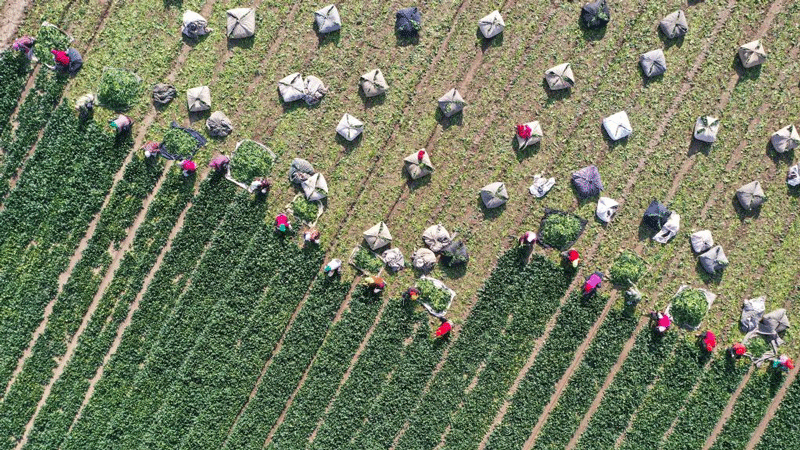Veterans greening desert town in Xinjiang

This aerial photo taken on July 5, 2022 shows veterans checking the irrigation pipes in Qiemo, a desert county in northwest China's Xinjiang Uygur Autonomous Region. (Xinhua/Li Xiang)
URUMQI, Nov. 19 (Xinhua) -- Over four years, Tian Ye and seven fellow veterans have grown hundreds of hectares of wind-blocking and income-making plants in the Taklimakan Desert in northwest China's Xinjiang Uygur Autonomous Region.
Since 2018, Tian, together with his partners, has grown more than 10 varieties of desert plants in southern Xinjiang's Qiemo County, including populus euphratica, rose willow, and saxoul, spanning more than 800 hectares.
Qiemo, a desert county with a fragile ecology, started to pursue desert control and afforestation projects in 1998, and since 2003, has brought in non-governmental sectors to utilize desert resources and develop the local economy.

This aerial photo taken on July 5, 2022 shows veterans walking in the Taklimakan Desert in northwest China's Xinjiang Uygur Autonomous Region. (Xinhua/Li Xiang)
In the spring of 2018, two years after retiring from the military, Tian visited Qiemo and saw locals planting trees in the desert.
In the fall, he and two other veterans set up an eco-agriculture company and started to grow saxoul and cistanche. Cistanche, a cash crop also called the "ginseng of the desert," parasitizes the roots of windbreaking saxoul.
Tian, now 47, believes that growing saxoul and cistanche can help prevent the desert from encroaching into the county while increasing the income of local communities.

Veterans process xanthoceras fruits at a storage in Qiemo, a desert county in northwest China's Xinjiang Uygur Autonomous Region, July 4, 2022. (Xinhua/Li Xiang)
Over the years, five more veterans have joined his company.
Growing plants in the desert is challenging in many ways. "It is very laborious. Basically, we wear out a pair of gloves every week and a pair of shoes every month," said Zhang Hong, one of the veterans.
The veterans have invested substantially in greening the desert, only to see slow returns. They have put in their own money and borrowed from family and friends, as well as from the bank.

Veterans pick cistanche deserticola, a traditional Chinese herbal medicine, in Qiemo, a desert county in northwest China's Xinjiang Uygur Autonomous Region, Oct. 31, 2022. (Photo by Su Xin/Xinhua)
"We fear no difficulties. It is our dream to make here a better place," Zhang said.
The veterans have been exploring ways to grow more cash crops in the desert. Last year, watermelon and potato were grown on a trial basis.
Since the company was set up, it has hired more than 20 locals of ethnic minority groups.

Veterans pick cistanche deserticola, a traditional Chinese herbal medicine, in Qiemo, a desert county in northwest China's Xinjiang Uygur Autonomous Region, Oct. 31, 2022. (Photo by Su Xin/Xinhua)
The veterans' efforts are part of a wider desert control campaign of Qiemo. In nearly a decade, the county has recorded more than 150,000 people participating in its afforestation initiatives, resulting in a "green Great Wall" surrounding Qiemo.
The "wall," with a length of 23 km and a width of 1-to-7 km, stretches more than 6,000 hectares.
Such desert control methods as growing cistanche "on the one hand speed up environmental improvement and ecological restoration of the desert terrain, while on the other hand help generate income for locals and grow the local economy," said Chang Qing, a senior engineer at the Xinjiang Institute of Ecology and Geography under the Chinese Academy of Sciences.
Photos
Related Stories
- PetroChina starts natural gas extraction for Hutubi
- Sugar beets harvest in Xinjiang
- Overseas returnee Ayinuer devotes herself to teaching in Xinjiang
- Cotton harvest comes to end in Xayar County, NW China's Xinjiang
- Apricot Valley in Xinjiang welcomes first snow in 2022 winter
- Herdspeople in China's Xinjiang move livestock to winter pastures
Copyright © 2022 People's Daily Online. All Rights Reserved.









